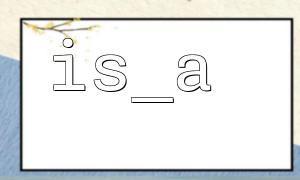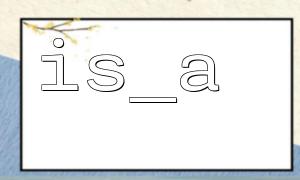Plug-in mechanism is a very common architectural design when developing scalable systems. Through plug-ins, developers can add new functions without changing the core code of the main system. In order to ensure that the structure of the plug-in meets expectations, it is usually necessary to determine whether a plug-in class inherits from a base class. In PHP, we can use the is_a() function to achieve this.
is_a() is a function used in PHP to determine whether an object is an instance of a class, or whether it is inherited from that class. Its function signature is as follows:
is_a(object|string $object_or_class, string $class, bool $allow_string = false): bool
$object_or_class can be an object or a class name (a string).
$class is the target class name you want to judge.
$allow_string If set to true , $object_or_class can be a class name, not necessarily an instance object.
When designing a plug-in framework, we usually have a plug-in base class, and all plug-ins must inherit this base class. For example:
abstract class PluginBase {
abstract public function run();
}
Next, we will have several plug-in implementations:
class HelloPlugin extends PluginBase {
public function run() {
echo "Hello from plugin!";
}
}
At this time, we need to load a plugin class and determine whether it inherits from PluginBase . This is_a() can be used.
For example, the plug-in class is loaded dynamically through reflection or configuration files, we can check this way:
$pluginClass = 'HelloPlugin';
if (class_exists($pluginClass) && is_a($pluginClass, 'PluginBase', true)) {
$pluginInstance = new $pluginClass();
$pluginInstance->run();
} else {
echo "Plugin $pluginClass Not compliant with the specifications,Must inherit from PluginBase";
}
Here, is_a($pluginClass, 'PluginBase', true) is to determine whether $pluginClass inherits from PluginBase , where the third parameter true means that the class name string is allowed to be passed instead of the instance.
Plugins are usually PHP files distributed in a specific directory. We can combine the automatic loader to automatically load the class and then use is_a() to make judgments. For example:
spl_autoload_register(function($class) {
include_once __DIR__ . '/plugins/' . $class . '.php';
});
$pluginList = ['HelloPlugin', 'AnotherPlugin'];
foreach ($pluginList as $pluginClass) {
if (class_exists($pluginClass) && is_a($pluginClass, 'PluginBase', true)) {
$plugin = new $pluginClass();
$plugin->run();
} else {
echo "Plugin $pluginClass invalid,neglect\n";
}
}
For example, you have a URL https://m66.net/plugin-feed to provide a list of plug-in updates. You can dynamically get the plug-in class name from this interface, download the plug-in file and load it. After loading, it is_a() to determine whether the plug-in is legal:
$pluginData = json_decode(file_get_contents('https://m66.net/plugin-feed'), true);
foreach ($pluginData as $pluginClass => $pluginFile) {
file_put_contents(__DIR__ . "/plugins/$pluginClass.php", file_get_contents($pluginFile));
include_once __DIR__ . "/plugins/$pluginClass.php";
if (is_a($pluginClass, 'PluginBase', true)) {
$plugin = new $pluginClass();
$plugin->run();
}
}
This not only ensures the flexibility of the plug-in mechanism, but also enhances the security and stability of the system.












